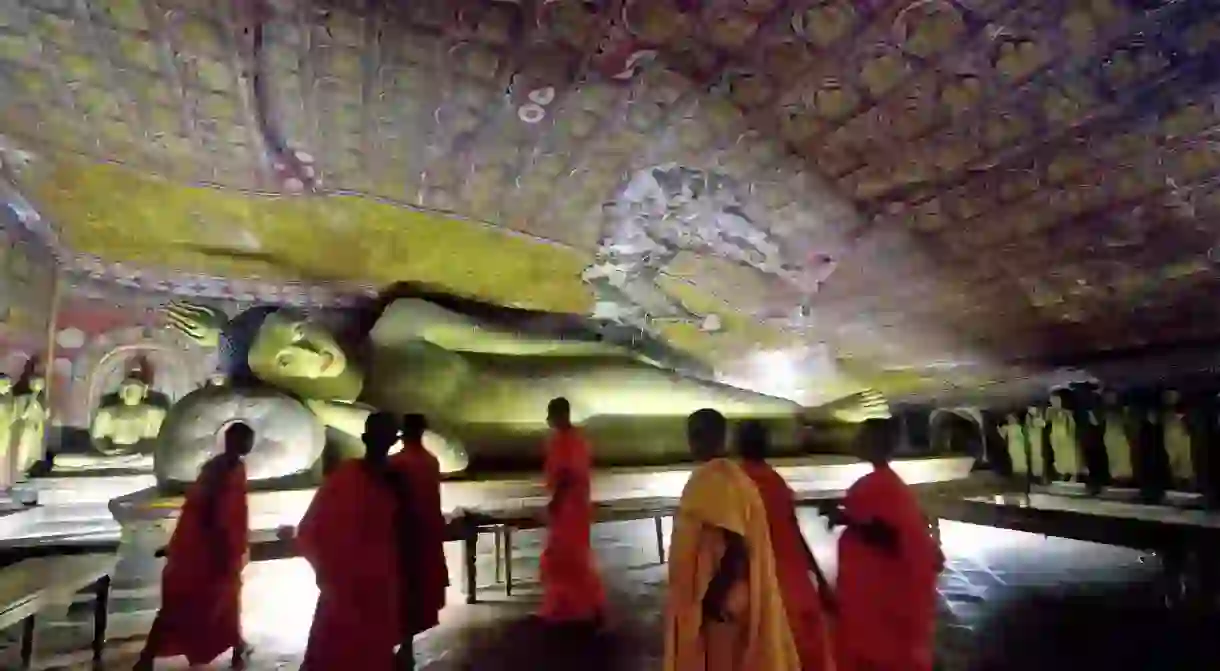Visit the Dambulla Cave Temple in Sri Lanka

Discovering the largest cave temple complex in Sri Lanka is a journey that rewards you with an unforgettable sight of peace and tranquility.

Built at the base of a 150m-high (490ft) rock, the golden temple of Dambulla is spread over five caves filled with stunning Buddhist statues and paintings.
Where in Sri Lanka is the Dambulla Cave Temple located?
The Central Province of Sri Lanka, situated in the Matale District, is home to the town of Dambulla.
The main entrance (with its majestic golden Buddha) was actually built in the 19th century. The golden Buddha’s hands are in the teaching position, as a welcoming sign to anyone who steps through its hallowed door.
There are flowers adorning the outside of the main entrance and in the vast courtyard surrounding it. To the left of this impressive structure are the stairs that will eventually take you up to the cave temple. There are a lot of stairs to climb, so be prepared – you’ll definitely hit your daily step count doing the walk.
Living history
One of Sri Lanka’s greatest hidden wonders, the cave temple has stood since the 1st century BC. Inhabited by Buddhist monks since the 3rd century BC, it still operates as a practising place of worship for thousands, making it a must-see pilgrimage on your journey.
In 1st century BC, King Valagamba used the caves for refuge during his 14-year exile from the Anuradhapura Kingdom. Buddhist monks who meditated in the caves of Dambulla provided the king protection from his many enemies – a gesture that didn’t go unnoticed. When King Valagamba returned to the throne at Anuradhapura, he had a majestic rock temple built at Dambulla as a token of his gratitude to the Dambulla monks.
The colours of the statues in the temple have been preserved by being in the dark interiors of the cave and away from the harsh effects of natural light. As a result, they haven’t aged in the same way as other monuments from the same era, which is remarkable to see up close and first-hand.
The walk
The journey up to the cave is 364 steps long, across winding paths that curve and hug the terrain. It’s no easy feat, but the trip is worth the climb. There are places where you can catch your breath during the ascent, and the views across the land are certainly something you’ll want to take in. When you get to the top, even more breathtaking views and stunning scenery await you. When you get to the summit, you’ll have to take your shoes off to enter the temple area. There are people who look after your footwear for a nominal fee, so you can go around and explore freely. Thankfully, it’s a lot easier making your way back down after your visit, with gravity being on your side.
Interiors
A little lotus pond greets you outside the entrance to the cave temple and is a marker for the tranquility that you find at the Dambulla Cave Temple. Built under the overhanging lava rock, brilliant-white corridors and long walkways surround the area and lead you into the individual caves.
Original paintings and murals adorn the walls of the cave and ceiling, each with intricate detail that you can get lost in. The images on the ceiling all have interesting stories attached to them, which is why an informed local guide can really enhance your trip.
A total of 153 Buddha statues inhabit the cave temple, with the largest measuring a whopping 15 metres (49ft) long. The cave ceiling has experienced some water damage during the years, meaning that some of the paintings are damaged, but it doesn’t detract from what a remarkable feat of human endeavour this all is, done by a devoted set of people who had an unsinkable faith.
Observing traditions and dressing for the occasion
Don’t forget that this is a spiritual centre for Buddhists in Sri Lanka, so be considerate and dress modestly to respect the local customs. Exploring the temple barefoot presents its own challenges. While the interiors are smooth and easy to navigate, there can be pockets of rocky terrain to keep an eye out for. Given the climate and the time of day you go, your bare feet could be stepping on some quite toasty rock surfaces, which could be an issue for some. The most important rule to observe, though, is that while you can take pictures of the Buddha itself, you can’t take any of you with the Buddha (especially not a selfie). This is strictly enforced, and guards have been known to ask patrons to delete their photographs before leaving.
Tips for visiting
Once you’ve reached the top, allow yourself a good couple of hours to explore the temple grounds properly.
Bring enough drinking water with you, because there are no shops up there.
It’s worth getting a guide to fully explain each of the caves in greater depth.
When visiting the Dambulla Cave Temple, a neat trick is to start with the last cave and work your way backward. The last two caves are the newest and are a lot less grand, so your journey becomes more impressive with every subsequent cave you visit. It can also help with dealing with the crowds by working against the flow of people.
Monkeys are everywhere, and monkeys will steal everything you have! Sure, they look cute just lounging around in the sun grooming each other, but they are a mischievous bunch who are always concocting plans, so keep an eye on your valuables.
Come and visit the temple at dawn or sunset to get a less busy experience and be rewarded with some wonderful scenic views as a bonus for beating the crowds at peak times.













